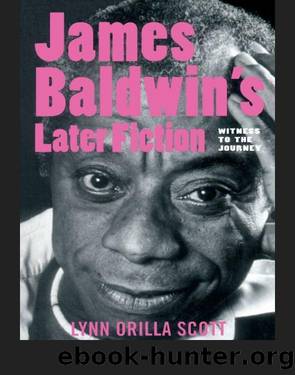James Baldwin's Later Fiction by Lynn O. Scott

Author:Lynn O. Scott
Language: eng
Format: epub
Publisher: Michigan State University Press
If Beale Street Could Talk responds to key elements of the Moynihan Report and the ensuing controversy. First, it repeats the fundamental assumption that the family is the defining social institution. Beale Street demonstrates the sentiment expressed by Martin Luther King that âthe institution of the family is decisive in determining not only if a person has the capacity to love another individual but in the larger social sense whether he is capable of loving his fellow men collectively. The whole of society rests on this foundation for stability, understanding and social peace.â149By making the Rivers family an agent of resistance rather than a microcosm of destructive social forces, the novel seems to reinforce the idea that families make society rather than vice versa. The centrality of the family in sustaining the individual is reinforced by the absence of organizations (such as the church, political groups, neighborhood groups, or social services) involved in Fonnyâs defense and the familyâs support. Second, Beale Street not only reflects the Reportâs focus on the family as the defining institution of black life, but the idealized Rivers family reflects the image of the family headed by an employed adult male, a nuclear, patriarchal family, as the desired formation or norm. The importance of fatherhood as a central theme is demonstrated through the character of Joseph, who lives up to both his Old Testament and New Testament forebears as the good father who successfully raises a family in âEgyptâ and who âfathers,â in this case grandfathers, a savior. Also, it is his impending fatherhood that gives Fonny his will to survive the horror of imprisonment. Fonny tells Tish, âIâve got to hold our baby in my arms. Itâs got to be. You keep the faith.â150
While Beale Street seems to reinforce the Moynihan Reportâs emphasis on the family as key to African American survival and progress, it clearly revises the association of âpathologyâ with the black family by placing the responsibility for Tish and Fonnyâs troubles on the pathology of racism. As the title of the novel suggests, Tish will give us an insiderâs view of her situation, one which challenges the view of the dominant discourse on the black family. Through the lens of Moynihanâs sociology, Fonnyâs imprisonment and Tishâs pregnancy are two examples of the statistics pointing to the âfailure of youthâ resulting from the âtangle of pathologyâ in poor, urban black families. Tish is aware of this vision of her troubles, a vision which makes her at best an object of pity and at worst a despised and rejected âother.â Returning home after visiting Fonny in prison in the novelâs opening scene, she thinks:I canât say to anybody in this bus, Look, Fonny is in trouble, heâs in jailâcan you imagine what anybody on this bus would say to me if they knew, from my mouth, that I love somebody in jail?âand I know heâs never committed any crime and heâs a beautiful person, please help me get him out. Can you imagine what
Download
This site does not store any files on its server. We only index and link to content provided by other sites. Please contact the content providers to delete copyright contents if any and email us, we'll remove relevant links or contents immediately.
Materializing Queer Desire : Oscar Wilde to Andy Warhol by Elisa Glick(113)
Understanding Jim Grimsley by David Deutsch(95)
Archaic Modernism: Queer Poetics in the Cinema of Pier Paolo Pasolini by Daniel Humphrey(93)
Malicious Objects, Anger Management, and the Question of Modern Literature by Kreienbrock Jörg;(84)
Small Fires by Julie Marie Wade(76)
White, Edmund by Interview & Philip Gambone (1999)(58)
